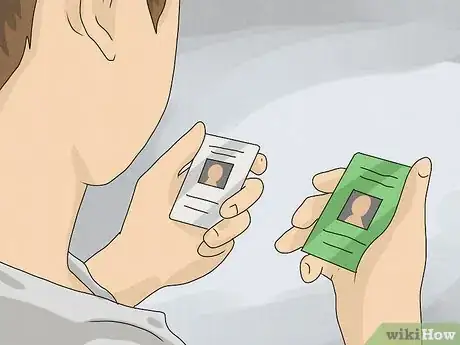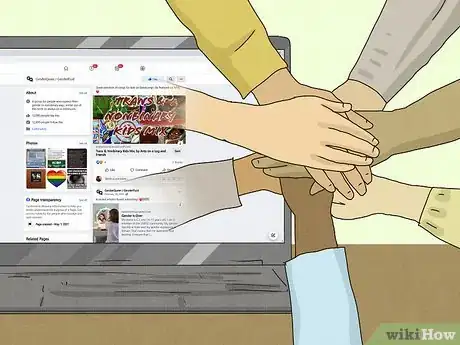This article was co-authored by Inge Hansen, PsyD and by wikiHow staff writer, Janice Tieperman. Dr. Inge Hansen, PsyD, is the Director of Well-Being at Stanford University and the Weiland Health Initiative. Dr. Hansen has professional interests in social justice and gender and sexual diversity. She earned her PsyD from the California School of Professional Psychology with specialized training in the area of gender and sexual identity. She is the co-author of The Ethical Sellout: Maintaining Your Integrity in the Age of Compromise.
There are 12 references cited in this article, which can be found at the bottom of the page.
wikiHow marks an article as reader-approved once it receives enough positive feedback. In this case, 91% of readers who voted found the article helpful, earning it our reader-approved status.
This article has been viewed 43,919 times.
Figuring out your gender identity is a difficult but rewarding process, and we’re proud of you for finding a label that makes you feel safe, valid, and comfortable! But now that you’ve officially identified as agender, how can you live your truth in a way that feels authentic to you? Don’t worry–we’ve put together plenty of actionable, achievable advice to help you along your journey.
Steps
Expert Q&A
-
QuestionHow should I begin the conversation when coming out as Agender to my parents?
 Inge Hansen, PsyDDr. Inge Hansen, PsyD, is the Director of Well-Being at Stanford University and the Weiland Health Initiative. Dr. Hansen has professional interests in social justice and gender and sexual diversity. She earned her PsyD from the California School of Professional Psychology with specialized training in the area of gender and sexual identity. She is the co-author of The Ethical Sellout: Maintaining Your Integrity in the Age of Compromise.
Inge Hansen, PsyDDr. Inge Hansen, PsyD, is the Director of Well-Being at Stanford University and the Weiland Health Initiative. Dr. Hansen has professional interests in social justice and gender and sexual diversity. She earned her PsyD from the California School of Professional Psychology with specialized training in the area of gender and sexual identity. She is the co-author of The Ethical Sellout: Maintaining Your Integrity in the Age of Compromise.
Clinical Psychologist Parents show a wide range in terms of their ability and willingness to accept their kid’s gender or sexual orientation, so some will need a lot more time and education to help them adjust than others. If your parents have a negative reaction to your news, you may want to give them some space and get yourself some support from a friend or someone else who already knows and accepts your identity. Remember that their initial reaction is not their forever reaction, and that they may need space, time and education in order to catch up and be more ready to embrace you for your full authentic self. Sometimes you may be happily surprised at how welcoming your parents turn out to be right from the start.
Parents show a wide range in terms of their ability and willingness to accept their kid’s gender or sexual orientation, so some will need a lot more time and education to help them adjust than others. If your parents have a negative reaction to your news, you may want to give them some space and get yourself some support from a friend or someone else who already knows and accepts your identity. Remember that their initial reaction is not their forever reaction, and that they may need space, time and education in order to catch up and be more ready to embrace you for your full authentic self. Sometimes you may be happily surprised at how welcoming your parents turn out to be right from the start. -
QuestionWhat is gender dysphoria?
 Inge Hansen, PsyDDr. Inge Hansen, PsyD, is the Director of Well-Being at Stanford University and the Weiland Health Initiative. Dr. Hansen has professional interests in social justice and gender and sexual diversity. She earned her PsyD from the California School of Professional Psychology with specialized training in the area of gender and sexual identity. She is the co-author of The Ethical Sellout: Maintaining Your Integrity in the Age of Compromise.
Inge Hansen, PsyDDr. Inge Hansen, PsyD, is the Director of Well-Being at Stanford University and the Weiland Health Initiative. Dr. Hansen has professional interests in social justice and gender and sexual diversity. She earned her PsyD from the California School of Professional Psychology with specialized training in the area of gender and sexual identity. She is the co-author of The Ethical Sellout: Maintaining Your Integrity in the Age of Compromise.
Clinical Psychologist Gender dysphoria is a sense of discomfort or dissatisfaction with one’s assigned gender or sex. Sometimes it centers around certain body parts, and other times it is more focused around the roles, behaviors or general appearance associated with one’s assigned gender. If you notice persistent discomfort with multiple aspects of your assigned gender (not limited to aspects that are due to sexism or limited gender roles within a given culture or community), you may be experiencing gender dysphoria.
Gender dysphoria is a sense of discomfort or dissatisfaction with one’s assigned gender or sex. Sometimes it centers around certain body parts, and other times it is more focused around the roles, behaviors or general appearance associated with one’s assigned gender. If you notice persistent discomfort with multiple aspects of your assigned gender (not limited to aspects that are due to sexism or limited gender roles within a given culture or community), you may be experiencing gender dysphoria.
References
- ↑ https://studentaffairs.psu.edu/campus-community-diversity/lgbtq-community/explore-lgbtq-resources/identity-based-resources/gender-terms
- ↑ https://kidshelpline.com.au/teens/issues/gender-identity
- ↑ https://www.instyle.com/fashion/clothing/gender-neutral-brands
- ↑ Inge Hansen, PsyD. Clinical Psychologist. Expert Interview. 19 November 2019.
- ↑ https://www.bbc.com/news/uk-scotland-46567954
- ↑ https://www.diversitycenterneo.org/about-us/pronouns/
- ↑ https://www.diversitycenterneo.org/about-us/pronouns/
- ↑ https://kidshealth.org/en/teens/coming-out.html
- ↑ https://ideas.ted.com/some-advice-on-coming-out/
- ↑ https://kidshelpline.com.au/teens/issues/gender-identity
- ↑ https://studentaffairs.psu.edu/campus-community-diversity/lgbtq-community/explore-lgbtq-resources/identity-based-resources/gender-terms
- ↑ https://nonbinary.wiki/wiki/Directory_of_online_communities
- ↑ https://kidshelpline.com.au/teens/issues/gender-identity
- ↑ https://www.grlgbtqhealthcareconsortium.org/significantdates/agender-pride-day
- ↑ https://www.wright.edu/inclusive-excellence/culture-and-identity-centers/lgbtqa-center/international-lgbtqa-dates-to-know
- ↑ https://kidshelpline.com.au/teens/issues/gender-identity
- ↑ https://www.goodtherapy.org/learn-about-therapy/issues/lgbt-issues
- ↑ https://kidshelpline.com.au/teens/issues/gender-identity


















-Step-16.webp)



-Step-26.webp)
-Step-16.webp)


















































